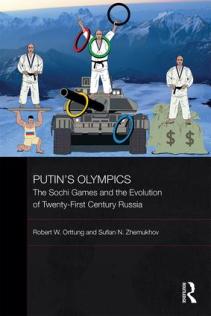 Robert W. Orttung’s & Sufian N. Zhemukhov’s book, Putin’s Olympics: The Sochi Games and the Evolution of Twenty-First Century Russia (Routledge, 2017), examines how the Sochi Olympics were designed to symbolize Russia’s return to great power status, but subsequent aggression against Ukraine, large-scale corruption, and the doping scandal have become the true legacies of the games. Placing the Sochi games into the larger context of Olympic history, authors reveal the consequences of Kremlin’s style of governance through mega-projects. The book is part of BASEES-Routledge Series on Russian and East European Studies. Book cover by Nart Shekim.
Robert W. Orttung’s & Sufian N. Zhemukhov’s book, Putin’s Olympics: The Sochi Games and the Evolution of Twenty-First Century Russia (Routledge, 2017), examines how the Sochi Olympics were designed to symbolize Russia’s return to great power status, but subsequent aggression against Ukraine, large-scale corruption, and the doping scandal have become the true legacies of the games. Placing the Sochi games into the larger context of Olympic history, authors reveal the consequences of Kremlin’s style of governance through mega-projects. The book is part of BASEES-Routledge Series on Russian and East European Studies. Book cover by Nart Shekim.
Reviews
 In their book, Orttung and Zhemukhov argue that what we’re seeing is a return to the national purpose of the Soviet mega-projects, though without an explicit ideology — other than the continuation of Putin’s rule and the enrichment of a new oligarchy.— Steven Lee Myers, The New York Times Magazine.
In their book, Orttung and Zhemukhov argue that what we’re seeing is a return to the national purpose of the Soviet mega-projects, though without an explicit ideology — other than the continuation of Putin’s rule and the enrichment of a new oligarchy.— Steven Lee Myers, The New York Times Magazine.
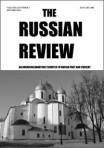
Indeed, parts of the event were stunningly beautiful and astonishingly affective. Nevertheless, Putin’s Olympics rightly and repeatedly reminds us that in the process of creating the Sochi experience, Putin, like his autocratic and authoritarian predecessors, broke a lot of eggs in order to make this cake.— Catherine A. Schuler, The Russian Review.
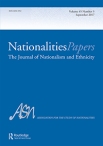 Robert Orttung and Sufian Zhemukhov’s book is an excellent and timely guide to the connections between Sochi and Crimea as the authors see the common origins of these events, saying that “the nature of the Putin regime led to both the Sochi games in the corrupt, authoritarian manner they occurred and the subsequent invasion of Ukraine.”— Richard Arnold, Nationalities Papers.
Robert Orttung and Sufian Zhemukhov’s book is an excellent and timely guide to the connections between Sochi and Crimea as the authors see the common origins of these events, saying that “the nature of the Putin regime led to both the Sochi games in the corrupt, authoritarian manner they occurred and the subsequent invasion of Ukraine.”— Richard Arnold, Nationalities Papers.
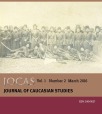 In a crowded field, Orttung and Zhemukhov have produced a well-structured and eminently readable book that is an essential reading for anyone seeking to understand what the legacy of Sochi Olympics really is.— Urban Jakša, Journal of Caucasian Studies.
In a crowded field, Orttung and Zhemukhov have produced a well-structured and eminently readable book that is an essential reading for anyone seeking to understand what the legacy of Sochi Olympics really is.— Urban Jakša, Journal of Caucasian Studies.
 The most provocative dimension of their argument concerns the invasion of Crimea, which occurred just after the Sochi Games ended on February 23. They assert that the concentration of military resources and personnel for the Sochi Olympics enabled the Crimean invasion.— Perry Sherouse, Journal of Sport History.
The most provocative dimension of their argument concerns the invasion of Crimea, which occurred just after the Sochi Games ended on February 23. They assert that the concentration of military resources and personnel for the Sochi Olympics enabled the Crimean invasion.— Perry Sherouse, Journal of Sport History.
 The Sochi Olympic story offers a privileged perspective to examine the contemporary urban, national, and international politics of Russia, which is the focus of Putin’s Olympics.—Gabriel Silvestre, Eurasian Geography and Economics.
The Sochi Olympic story offers a privileged perspective to examine the contemporary urban, national, and international politics of Russia, which is the focus of Putin’s Olympics.—Gabriel Silvestre, Eurasian Geography and Economics.
Orttung and Zhemukhov conclude that the games mostly served to enrich Putin’s associates, increase regime stability, and provide a solid base from which to launch the Crimean and Ukrainian actions.—Jenifer Parks, The Slavonic and East European Review.

Orttung ja Zhemukhov ajoittavat olympiaisännyyden historian 1990-luvulle, josta lähtien Vladimir Putin on tavalla tai toisella pyrkinyt edistämään olympialaisten saamista Venäjälle.—Pia Koivunen, Idäntutkimuksen.
![]()
Though the book focuses on the 2014 Olympic games, it still tackles timely topics.—A. Heaphy, Kent State University

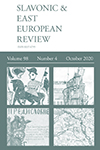
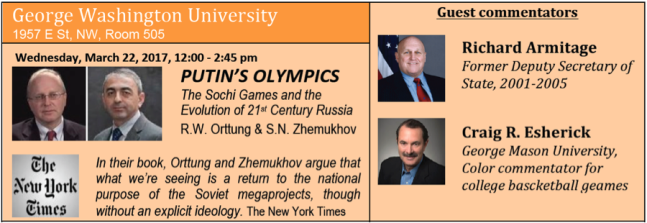

 Episode 29.
Episode 29. 


























